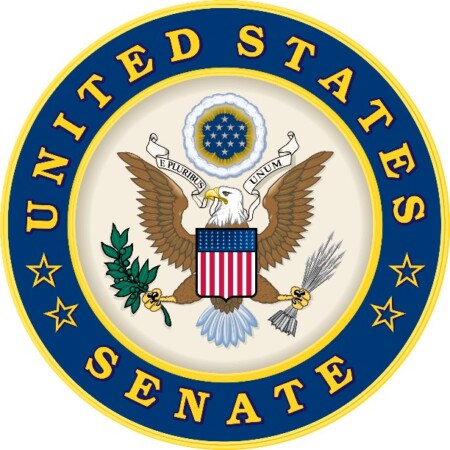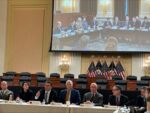United States Senate
PERMANENT SUBCOMMITTEE ON INVESTIGATIONS
Committee on Homeland Security and Governmental Affairs
Rob Portman, Chairman
Tom Carper, Ranking Member
THREATS TO U.S. NETWORKS:
OVERSIGHT OF CHINESE GOVERNMENT-OWNED CARRIERS
STAFF REPORT
PERMANENT SUBCOMMITTEE ON INVESTIGATIONS
UNITED STATES SENATE

I. EXECUTIVE SUMMARY
Information and telecommunications technologies bring the world closer together, allowing individuals and businesses nearly everywhere in the world to communicate with each other. The expansion of global telecommunications networks, in particular, acts as a driving force of economic development by affording individuals unprecedented access to information and opportunities. Understanding the increasing interconnectedness of society, the Federal Communications Commission (“FCC”)—the federal agency tasked with regulating the U.S. telecommunications industry—strives to open U.S. markets to foreign telecommunications carriers, where doing so is in the country’s public interest. As a result, foreign-owned carriers have established operations within the United States.
Not all international expansion of telecommunications carriers, however, is in the United States’ national security interests. Some foreign governments seek to exploit the openness of America’s telecommunications market to advance their own national interests. One such country is China. The Chinese government views telecommunications as a “strategic” industry. It has expended significant resources to create and promote new business opportunities for its state-owned carriers and has established barriers to market entry for foreign carriers seeking to operate in China. Today, three state-owned carriers dominate the Chinese telecommunications market: China Mobile, China Telecom, and China Unicom, commonly referred to as the “Big Three.” In addition to shoring up a stable domestic market for these carriers, the Chinese government has encouraged its carriers to expand into global markets, including the United States. This expansion, however, raises national security concerns. U.S. government officials have warned that Chinese state-owned carriers are “subject to exploitation, influence, and control by the Chinese government” and can be used in the Chinese government’s cyber and economic espionage efforts targeted at the United States.
The operation of Chinese state-owned telecommunications carriers in the United States garnered public attention in May 2019 after the FCC denied China Mobile International (USA) Inc. (“China Mobile USA”) the authority to provide international telecommunications services between the United States and foreign locations. The FCC premised its denial on national security concerns. This marked the first instance in which the FCC denied an application on national security grounds. Following that denial, the Subcommittee launched an investigation into how the U.S. federal government guards against risks posed by Chinese stateowned carriers already authorized to provide international telecommunications services between the United States and other points.
This report details how the U.S. federal government—particularly the FCC, Department of Justice (“DOJ”), and Department of Homeland Security (“DHS”)— historically exercised minimal oversight to safeguard U.S. telecommunications networks against risks posed by Chinese state-owned carriers. Three Chinese state-owned carriers have been operating in the United States since the early 2000s, but only in recent years have the FCC, DOJ, and DHS focused on potential risks associated with these carriers. DOJ and DHS did enter into security agreements with two of the Chinese state-owned carriers prior to 2010, but they conducted only two site visits to each carrier since that time (or four total). Three of those visits occurred between 2017 and 2018. This lack of oversight undermined the safety of American communications and endangered our national security.
Since the Subcommittee launched its investigation, the agencies have increased their oversight of the Chinese state-owned carriers. The administration also recently issued an executive order establishing a formal committee to review the national security and law enforcement risks posed by foreign carriers operating in the United States. Still, the new committee’s authorities remain limited, and as a result, our country, our privacy, and our information remain at risk.
* * * * *
The Chinese government exerts control over China’s domestic telecommunications industry and state-owned carriers. China aims to be a world leader in technology by 2050, including in the telecommunications sector. To achieve this goal, China controls who can provide domestic services by maintaining one of the most restrictive foreign investment regimes in the world. Although the Chinese government may publicly state that it is opening the telecommunications market, foreign companies are subject to burdensome regulatory requirements; required to enter into joint ventures majority owned by Chinese parties; and often forced to transfer both technology and know-how to Chinese counterparts. Stateowned carriers are equally controlled, as the Chinese government selects their management, sets target returns and growth rates, and compels companies to put state interests ahead of the carriers’ market interests. The Chinese government has encouraged state-owned telecommunications carriers to expand internationally. In 1999, the Chinese government issued a “Go Out” policy, through which it pledged financial support to entities to expand into global markets. Telecommunications carriers took advantage of this, with major state-owned carriers establishing operations across the world, including in the United States.
The Chinese government targets the United States through cyber and economic espionage activities and enlists state-owned entities in these efforts. Many U.S. government officials have highlighted the “persistent” threat posed by China.
As Assistant Attorney General of DOJ’s National Security Division John Demers stated, China’s “overall economic policy [is to] develop[ ] China at American expense.” U.S. government officials have also warned that China will use its stateowned carriers to further its national interests. At least one Chinese carrier is publicly alleged to have hijacked and rerouted communications data through China. This allows Chinese actors to access sensitive communications, regardless of whether the data is encrypted.
* * * * *
The Subcommittee reviewed the federal agencies responsible for regulating and monitoring foreign telecommunications carriers operating in the United States. Although foreign carriers have operated in the United States for decades, the U.S. government had no statutory authorities to monitor the risks associated with these carriers. This is especially evident when reviewing the agencies’ oversight of Chinese state-owned carriers.
The FCC regulates the U.S. telecommunications market. Carriers seeking to provide international telecommunications services between the United States and foreign points must apply for and obtain authorization from the FCC. The FCC’s process is aimed at protecting the U.S. market from anti-competitive behavior in foreign markets. Thus, in evaluating applications, the FCC considers whether the foreign carrier’s proposed services are in the public interest. Once authorization is granted, the Subcommittee found that it effectively exists in perpetuity; the FCC does not periodically review existing authorizations.
The FCC historically relied on “Team Telecom” to assess national security and law enforcement risks associated with a foreign carrier’s provision of international telecommunications services. The FCC’s public interest calculation involves weighing the national security, law enforcement, trade, and foreign policy implications associated with a foreign carrier’s proposed services. The FCC has recognized, however, that it lacks the subject-matter expertise to evaluate these topics, and thus, it relies on certain Executive Branch agencies for guidance. For years, three agencies—DOJ, DHS, and the Department of Defense (“DOD”), which until recently were collectively referred to as “Team Telecom”—were tasked with evaluating national security and law enforcement concerns. Where Team Telecom believed that risks may exist, it attempted to mitigate those risks through a security agreement with the foreign carrier. These agreements provided Team Telecom with oversight capabilities, including the right to visit the carrier’s U.S.based facilities. If Team Telecom opted not to enter into a security agreement with a foreign carrier, it had no insight into the carrier’s operations.
These measures were ineffective as Team Telecom lacked formal statutory authority, leaving its operations unstructured and ad hoc. Because of the lack of statutory authority, Team Telecom had no formal, written processes for reviewing applications or monitoring compliance with security agreements. The informality also resulted in protracted review periods and a process FCC commissioners described as “broken” and an “inextricable black hole” that provided “no clarity for [the] future.” For example, Team Telecom’s review of China Mobile USA’s application lasted seven years. Further, the agencies did not dedicate sufficient resources to ensure Team Telecom conducted oversight in an efficient and effective manner. The components of DHS and DOJ responsible for Team Telecom together historically tasked three employees with reviewing applications and monitoring compliance with security agreements. In April 2020, as the Subcommittee was nearing the end of its investigation, the President issued Executive Order 13913, replacing the informal Team Telecom with the Committee for the Assessment of Foreign Participation in the United States Telecommunications Services (“EO Telecom Committee”). The Executive Order seeks to address many of the shortcomings identified by the Subcommittee’s investigation. The Executive Order requires members of the EO Telecom Committee to enter into a memorandum of understanding by July 3, 2020. Therefore, this report continues to refer to Team Telecom, even in relation to actions taken after April 4, 2020.
Beginning in 2018, Team Telecom and the FCC publicly highlighted the national security concerns associated with Chinese state-owned carriers operating in the United States. China Mobile USA’s application marked the first instance in which Team Telecom recommended that the FCC deny a foreign carrier authorization to provide international telecommunications services on national security grounds. In its denial, the FCC relied on Team Telecom’s conclusion that China Mobile USA is “subject to exploitation, influence, and control by the Chinese government.” Such government control, Team Telecom warned, could advance the Chinese government’s cyber and economic espionage activities targeted at the United States. Team Telecom specifically cautioned that China Mobile USA would build relationships with major U.S. carriers, through which it could gain access to U.S. networks and the sensitive public and private data transferred across those networks.
At least three other Chinese state-owned carriers have been operating in the United States for decades. The U.S. subsidiaries of the two other Big Three carriers—China Telecom and China Unicom—along with a smaller state-affiliated provider ComNet (USA) LLC (“ComNet”) each received authorization to provide international telecommunications services in or prior to 2002 and have been operating ever since. During this time, these Chinese carriers have built relationships with major U.S. carriers and established points of presence across the United States. Further, China Telecom’s U.S. subsidiary, China Telecom Americas, provides services to Chinese government facilities in the United States. Until recently, Team Telecom conducted limited oversight of these Chinese state-owned carriers. Team Telecom entered into security agreements with China Telecom Americas (2007) and ComNet (2009), but it exercised minimal oversight over those entities until recently. During the more-than-ten year period in which these security agreements have been in effect, Team Telecom conducted just two site visits to each company—or four in total, three of which occurred within the past three years. At no point did Team Telecom enter into a security agreement with China Unicom Americas, meaning Team Telecom has no oversight authority to assess the company’s operations in the United States.
The national security concerns Team Telecom and the FCC outlined in relation to China Mobile USA are applicable to the Chinese state-owned carriers currently operating in the United States. In advocating that the FCC deny China Mobile USA’s application, Team Telecom raised a number of national security concerns related to China Mobile USA’s Chinese government ownership. As Team Telecom officials acknowledged to the Subcommittee, those concerns also apply to China Telecom Americas, China Unicom Americas, and ComNet. The carriers are ultimately owned by the Chinese government; are required to comply with Chinese national security laws to support the Chinese government’s intelligence work; and have established relationships with U.S. carriers, giving them access to critical infrastructure that the Chinese government could exploit in its economic and cyber espionage efforts. Team Telecom recognized these issues in its recent recommendation that the FCC to revoke China Telecom Americas’ authorizations. The FCC also indicated its awareness of these concerns, when it recently called for all the carriers to demonstrate why their authorizations should not be revoked.
* * * * *
It must be noted that state-ownership does not presume a national security risk. Indeed, many foreign telecommunications companies around the world are state-owned. There are also compelling commercial interests dependent on facilitating the flow of data between the United States and China, which are among each other’s top trading partners. The vast global telecommunications and technology infrastructure that facilitates commerce and economic development include undersea, terrestrial, wireless, and space-based networks jointly owned or operated by Chinese and Western companies.
Commercial interests, however, must be balanced against national security interests. Striking an appropriate balance between these interests requires the Executive Branch to exercise greater oversight and regularly evaluate the risks posed by foreign-owned companies, especially considering that national security concerns evolve over time. Currently, Chinese state-owned carriers are providing international telecommunications services based on FCC authorizations granted more than a decade ago, in some cases nearly two decades. The carriers have provided services during this time, with minimal oversight from Team Telecom.
The Subcommittee’s Investigations
This investigation continues the Subcommittee’s examination of national security issues involving China. During the 115th Congress, the Subcommittee highlighted China’s leading role in the opioid crisis by investigating how illicit opioids like fentanyl are shipped from China to the United States through international mail. The Subcommittee held an initial oversight hearing on May 25, 2017, titled “Stopping the Shipment of Synthetic Opioids: Oversight of U.S. Strategy to Combat Illicit Drugs.” On January 25, 2018, the Subcommittee held a second hearing and issued a bipartisan report titled “Combatting the Opioid Crisis: Exploiting Vulnerabilities in International Mail.” On October 24, 2018, the President signed into law the Synthetic Trafficking & Overdose Prevention Act (“STOP Act”), legislation designed to assist law enforcement in identifying and stopping fentanyl being shipped into the United States.
In the current 116th Congress, on February 28, 2019, the Subcommittee held a hearing and issued a bipartisan report titled “China’s Impact on the U.S. Education System.” The Subcommittee examined China’s propaganda efforts at U.S. colleges and universities through Confucius Institutes. The Chinese government funds Confucius Institutes and hires Chinese teachers to teach language and culture classes to students and non-student community members. Confucius Institute funding comes with strings that can compromise academic freedom. The Chinese government approves all teachers, events, and speakers. Some U.S. schools contractually agree that both Chinese and U.S. laws will apply. The Chinese teachers sign contracts with the Chinese government pledging they will not damage Chinese national interests. The Subcommittee found that these limitations export China’s censorship of political debate to the United States and prevent the academic community from discussing topics that the Chinese government believes are politically sensitive. In addition, a number of U.S. schools have been prevented from opening American cultural and educational centers in China. The Subcommittee recommended that, absent full transparency regarding how Confucius Institutes operate and full reciprocity for U.S. cultural outreach efforts on college campuses in China, Confucius Institutes should not continue in the United States. Twenty-one Confucius Institutes have closed since the Subcommittee published its report.
The Subcommittee continued its review of China’s influence in the United States this congress by examining China’s talent recruitment plans. On November 18, 2019, the Subcommittee released a bipartisan report titled “Threats to the U.S. Research Enterprise: China’s Talent Recruitment Plans.” The Subcommittee also held a hearing related to China’s talent recruitment programs on November 19, 2019. The Subcommittee examined how American taxpayers have been unwittingly funding the rise of China’s economy and military over the last two decades while federal agencies have done little to stop it. The Subcommittee found that China has been recruiting U.S.-based scientists and researchers and incentivizing them to transfer U.S. taxpayer-funded intellectual property to China for China’s own military and economic gain. The Subcommittee focused specifically on China’s most prominent talent recruitment program, the Thousand Talents Plan. The Subcommittee also surveyed seven federal agencies’ efforts to combat the theft of American taxpayer-funded research and technology through Chinese talent recruitment programs, finding that the U.S. government does not have a comprehensive strategy to combat this threat.
At the November 19, 2019 hearing, the FBI’s Assistant Director for Counterintelligence stated that “[w]ith our present-day knowledge of the threat from Chinese talent plans, we wish we had taken more rapid and comprehensive action in the past, and the time to make up for that is now.” Following the Subcommittee’s report and hearing, the Department of Justice has charged several individuals with crimes related to their participation in the Thousand Talents Plan, including the Chair of Harvard’s Chemistry and Chemical Biology Department.
Finally, the Subcommittee has examined cyberattacks against U.S. companies that have been attributed to Chinese actors. On March 7, 2019, the Subcommittee released a bipartisan report titled “How Equifax Neglected Cybersecurity and Suffered a Devastating Data Breach.” The Subcommittee held a hearing on the report on March 7, 2019, which also examined the 2018 data breach suffered by Marriott. Chinese military personnel were indicted for their involvement in the Equifax breach on February 20, 2020, and Attorney General Barr indicated in announcing those indictments that Chinese government officials are also responsible for the attack against Marriott.
For this investigation, the Subcommittee reviewed more than 6,400 pages of documents and conducted more than 10 interviews, including interviews with individuals from the FCC, DOJ, DHS, China Telecom Americas, China Unicom Americas, ComNet, AT&T, Verizon, and CenturyLink. The Subcommittee also met with researchers who analyzed the Chinese government’s use of telecommunications carriers to hijack communications. All entities and individuals complied with the Subcommittee’s requests for information, documents, and interviews.
You can download here The Full Report






Leave a Reply